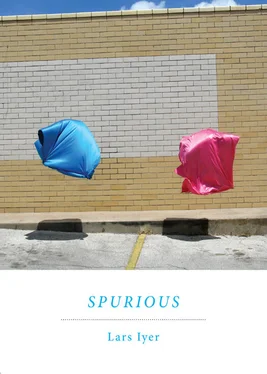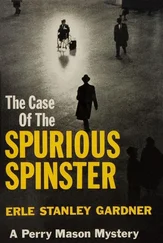‘So what are you going to do about your leak?’, says W. I show him the kitchen. The dehumidifiers, working twenty-four hours a day, are sucking out the damp. They fill up every twelve hours. — ‘That’s a lot of water’, says W. ‘Where does it come from?’ No one knows, I tell him. The greatest experts on damp are completely baffled.
W. wants to understand me, he says. He’s decided to list my affects. You can do it for any living thing, he says. A tick, for example, responds to heat and warmth. — ‘It’s a very simple being. Like you. You’re simple’.
‘We’ll start with the living room’, he says. Am I taking notes? I’m writing on a post-it pad. — ‘It’s cold’, he says. ‘Write that down. I’m freezing. How can you live like this? And it’s dark’, he says. ‘There’s no light. I can’t see anything. And it’s damp. That’s another affect’. It’s better than it was, I tell him.
Why am I always putting vaseline on my lips? W. wonders. — ‘Vaseline’, he says, that’s another of your affects. The internet. That’s what scholarship is for you, isn’t it? How can you go on reading that bilge? You’ve got no honour. No shame. No goodness’.
W. looks out of the window at the rotting plants in the yard. — ‘Horror. That’s your other affect, isn’t it? Look at it out there. It’s shit. How can you live like this?’
W. is delineating the basic categories, he says. — ‘Television. You like TV, don’t you?’, says W. I tell him I don’t watch it that much. — ‘I’m not surprised. The remote is broken. How can you watch anything?’
‘So what else do you do? Are there any affects for you in the bathroom?’ I’m indifferent to the bathroom, I tell him. — ‘What do you think about when you’re in there?’ Nothing, I tell him. You, I tell him, and he laughs.
‘Well then, your bedroom. Is that where you do your reading? You don’t really read anything, do you? You don’t read. And what about the kitchen? Those stacks of tinned fish. You eat the same thing every day, don’t you? Exactly the same thing!’ W. is a believer in a varied diet, he says. — ‘I try to vary what I eat. Not like you’.
W. concludes he has a larger range of affects than me. He lives with someone. That’s what does it. — ‘Otherwise I’d be a sad fucker like you’. Of course W.’s house is much nicer, he points out. It’s not cold, for one thing. Or dark. Or damp.
The previous owners dug right down to the foundations to get rid of the damp, W. tells me. They put down a layer of plastic sheeting, then a layer of concrete, then another layer of sheeting, all the way up. — ‘It’s dry as a bone’, W. says.
W.’s tired of listing my affects. How many have we got? Eight general categories, I tell him. He looks around. — ‘Oh fuck it, that will do’.
W. feels ill from all the drinking, he says. Last night, we had a bottle of red wine, then beer, then we drank Tequila from the bottle. Then we finished off the bottle of Plymouth Gin, then a bottle of Cava and then a bottle of Chablis. It was a good Chablis, wasn’t it? W. says he was in no position to appreciate it. He wants some aspirin, he says. — ‘And how are you feeling?’, he asks me. Fine, I tell him. Better than usual. — ‘Any thoughts?’ Not one.
We head out to the coast for the day, and eat fish and chips on the Fish Quay. We wander through the deserted markets. It’s a melancholy sight. There’s a special kind of melancholy to the quayside, W. and I agree. What is it? The sense that it’s all over, it’s all finished, and a whole civilisation has come to an end, which in fact it has.
We watch the big seagulls strutting about, and the pigeons. — ‘What do you feel about pigeons?’, W. asks me. The Romans brought them to England to eat. They crowd on his window ledge every morning, W. says, cooing and flapping their wings. What miserable birds! He prefers the seagulls, of course. They remind him of the sea, he says, and he loves the sea.
On one side of us, the Tyne broadens as it reaches its end; on the other, a passenger ferry at the dock, ready to disembark for Norway. Should we go to Norway? W, wonders. Would they make sense of us there?
‘Your problem is that you fear empty time’, says W. as we head back to the city. ‘That’s why you don’t think’. And then: ‘Thought must come as a surprise, when you least expect it’.
Thought, when it comes, always surprises him, says W. But he’s ready with his notebook, he says, which he keeps in his man bag. That’s why I need a man bag, he says, in case thought surprises me. But I fear the empty time which makes thought possible, says W., so I don’t need a man bag.
The next morning, W.’s flight is cancelled. He’s stranded in my flat for another day and night. This place is a shithole, he says, and starts to read Spinoza to forget the cold and the dark and the damp.
When he reads Spinoza, W. says, he feels beatitude. Beatitude, he says, the third level of knowledge. — ‘You’ve never felt beatitude’, says W. ‘You’re not capable of it’.
W. is a mystic. One day he might become properly religious. — ‘Do you think you’ll ever become religious?’, he asks me. He says that he might. Sometimes he feels on the verge of religion.
W. says The Ethics is the only book he’s ever thought is completely right. — ‘It’s the opposite of your flat’, says W. ‘God, it’s cold. And dark. Why is it so dark? And why does nothing work? Half your lights, for example. Your kitchen. Your TV. Do you just go into the shops and ask for the shittiest thing they have?’, says W. ‘Nothing ever changes for you, does it? There’s no movement forward’.
W. wants to read Spinoza in Latin, but he’s forgotten all he knew of the language. He’ll have to learn it again! But it’s not a chore. — ‘You have to read in the original language’, he says. ‘Of course you wouldn’t know anything about that’. Next he’ll refresh his Greek.
W. recalls our Greek lessons, he on sabbatical, me a young student. — ‘You seemed intelligent then, full of promise’. Of course, I was no such thing, he realised quickly. W. and the others had the answer book and used to crib from its translations in advance. They liked to watch me squirm with my exercises. — ‘Your idiocy was spectacular’, says W. ‘Omoi! , that’s was all you could say. Omoi! omoi! , like a wounded bull’.
For his part, W. has given up learning differential calculus. — ‘It’s beyond me’, he says. Will he ever really understand Leibniz — or Cohen, with his mathematical mysticism? Never mind, he says; he has Spinoza. — ‘Ah, The Ethics’ , he sighs. ‘Beatitude!’, he sighs.
The damp, I say to W. That’s my apocalypse. Does he know I have mushrooms growing from the ceiling? Does he know they’re gathered in the far upper corner of the kitchen? It used to make me shudder, I tell W. I used to hate it. But now …
I’m fascinated by the damp, I tell W. I can’t help it. I go out there again, to the kitchen, to the bathroom. I put my hand on the clammy wall. The damp is calling me. The damp wants a witness to itself. And who am I but the one who sees it, touches it? Who am I but the one with its spores in his lungs?
One night it grew me, I tell W. One night a spore unfolded itself to a make a man, a golem of damp. And the damp wrote its name on my forehead and placed its charm on my tongue …
Somewhere, on the other side of the wall, life has reached a new level, I tell W. Somewhere, damp mutters to itself; damp dreams, there behind the wall. And what will it say when it comes to itself? What will it say when it wakes up?
What will he write about next? W. muses. What’s to be his next project? He’s casting about, he admits it. Wasn’t he supposed to learn Greek this summer? Protestant guilt keeps driving him into the office, he says. In he goes on the bus, thinking he ought to be doing something, but not quite sure what. He sits in the office among the parcels of review copies of books he keeps receiving. There are dozens of them, piled up all over the place. They depress him enormously. He can’t bear to look at them.
Читать дальше












